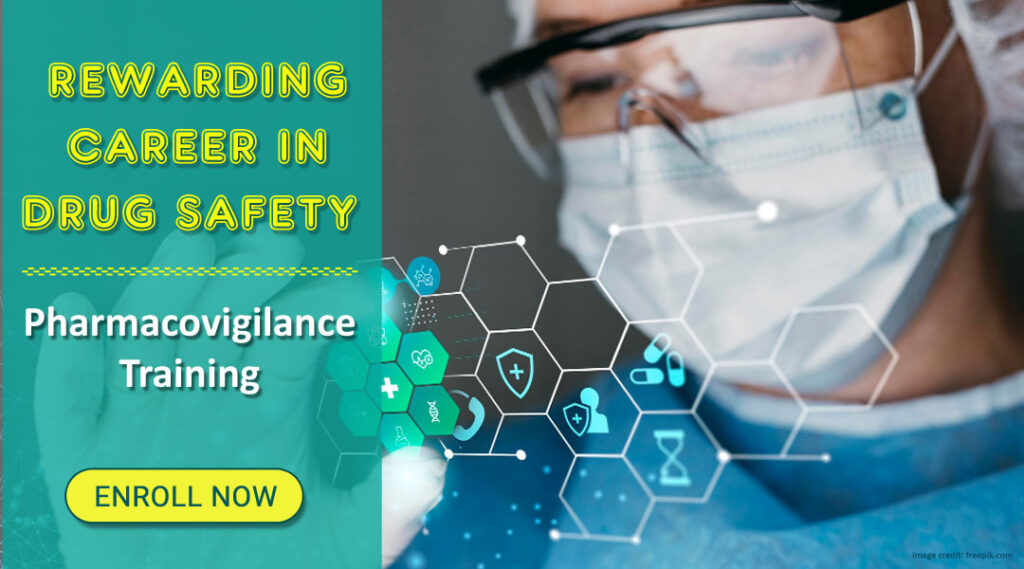Recent years have witnessed heightened drug safety concerns, leading to increased scrutiny by regulatory authorities. Europe, in particular, has undergone extensive revisions to pharmacovigilance regulations. Since July 2012, pharmaceutical companies have diligently adapted to the New EU Pharmacovigilance Regulations and Good Pharmacovigilance Practice Modules.
Pharmaceutical industry is grappling with a surge in Adverse Drug Reactions (ADRs) year-on-year, necessitating trained resources capable of swiftly detecting and managing drug risks. Proactive pharmacovigilance throughout a product’s life cycle is crucial for safeguarding against inappropriate removal.
The increasing pharmacovigilance awareness in the USA showcased the urgent need for trained personnel. A comprehensive curriculum and a shift in mindset within the clinical research and pharmacovigilance field are essential to achieve this.
Pharmacovigilance and its Importance
Pharmacovigilance, crucial in clinical research and drug development, focuses on detecting, assessing, understanding, and preventing adverse effects of medicines. Recent drug withdrawals prompted a higher industry and regulatory standard. Early signal detection, adopted by major pharmaceutical companies, aims to identify and manage risks effectively throughout a product’s life cycle. This evolving discipline requires continuous refinement to enhance its value in public health.
While pharmacovigilance is advancing globally, the right professionals with skills is what is lacking with widespread knowledge. Therefore proper training programs are crucial to integrate good pharmacovigilance practices, ensuring regulatory compliance, and improving clinical trial and post-marketing surveillance safety. As the global push for patient safety grows, addressing drug-related risks becomes more prominent, offering substantial challenges and opportunities in USA and worldwide.
What Is Pharmacovigilance Training?
Pharmacovigilance training aims to instruct professionals on the methodologies, principles, and procedures integral to pharmacovigilance. Pharmacovigilance is the discipline dedicated to monitoring, identifying, evaluating, and averting adverse effects or other issues related to drug use. This field is crucial for safeguarding patient well-being and advancing public health.
In the competitive global economy, organizations recognize the significance of workforce skills, knowledge, and motivation. According to the American Society for Training and Development, U.S. organizations invest over $126 billion annually in employee training. Training, a systematic learning approach, enhances individual, team, and organizational effectiveness. It goes beyond declarative and procedural knowledge, extending to strategic knowledge and consistency in performance.
For pharmaceutical organizations, pharmacovigilance service providers, and staff to enhance overall performance, trained and experienced personnel are essential. Purposeful pharmacovigilance training with certification programs are crucial, equipping employees with the skills needed for seamless daily pharmacovigilance activities. Pharmacovigilance and the importance of targeted training and development programs has become prominent.
Who can take up Pharmacovigilance Training?
To qualify for a Pharmacovigilance training course Program, you must meet one of the following eligibility criteria.
- Hold a bachelor’s degree in life science or bioscience.
- Hold a degree in the field of Medicine.
- Have a bachelor’s degree in Pharma sciences or a nursing degree.
Why Choose Octovion for Pharmacovigilance Training
Adapting to country-specific needs and trainee knowledge levels is essential for a comprehensive approach to pharmacovigilance training. Given the diverse stakeholders in society, training must vary in levels, content, and duration. Health professionals in hospitals may require a brief one-week course on ADR mechanisms, reporting, and patient management. Dedicated days of training are necessary for pharmacovigilance professionals involved in data collection, processing, and analysis. Specialized in-depth training in sub-areas is also crucial.
Octovion offers an exceptional Pharmacovigilance Course, finely tuned to integrate theoretical knowledge with hands-on practical expertise. Our commitment to providing assured placements sets us apart from all other players in the market.
Our meticulously chosen faculty ensures immersive training experiences for every participant at our Pharmacovigilance course. Support is always at your fingertips. The syllabus aligns with industry standards, and we continuously adapt to stay abreast of the latest industry developments.
Modules that can be expected as part of the course.
- Principles of Pharmacovigilance
- Medical Aspects of Adverse Drug Reactions from Various System Organ Classes (SOCs)
- Pharmacovigilance Reporting Systems and Tools for Report Management
- Global Pharmacovigilance and Safety Standards
- Methodologies in Pharmacovigilance
- Management of Drug Safety Data
- Signal Detection
- Benefit-Risk Determinations
- Communication in Pharmacovigilance
- Setting up of Pharmacovigilance Department; Standard Operating Procedures used in Pharmacovigilance & Department links to Pharmacovigilance
- Pharmacovigilance Compliance and Inspections
Practical’s include hands-on experiences, discussions, projects, presentations, and case studies covering ADR reporting, causality, signal detection, benefit-risk, and risk management plans. Continuous training on the job is essential for building expertise in pharmacovigilance and patient safety monitoring.
Furthermore, we go the extra mile by offering assured placements with interview training, ensuring that every learner from our Pharmacovigilance course is fully equipped for immediate employment. For inquiries, contact us at +1 (908) 617-0009 or drop us an email at info@octovion.com.

Conclusion
As healthcare continues to evolve, pharmacovigilance which is a the science dedicated to monitoring and safeguarding against adverse drug reactions (ADRs), plays a pivotal role in maintaining the safety of medications.
To help professionals, taking up proper training programs in pharmacovigilance is necessary ,particularly among medical, pharmacy, and nursing students. Such training not only helps in awareness of their responsibility to report ADRs but also helps in gaining expertise in pharmacovigilance.
Owing to the demanding nature of pharmacovigilance, it opens avenues for substantial opportunities, including the potential to significantly lessen harm to patients and cut costs within healthcare systems. Holistic training programs, with the right knowledge and skills among professionals, position pharmacovigilance as a powerful contributor to the overall health of a nation. Also with a good understanding of pharmacovigilance principles and practices, the healthcare community can actively engage in the safeguarding of patients and contribute to the efficiency of healthcare systems.



